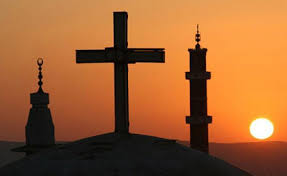We recalled in part I that, according to Muslims, the last Revelation taught them to recognize all the books of the prophets who had gone before. They all had the same purpose: to remind human beings of the presence of the Creator and the finiteness of life on earth. The Islamic tradition’s concept of humankind emerged through this teaching: after forgiving Adam his sin, God told men: “A guidance will certainly come to you from me. Those who follow my guidance will have nothing to fear and will not grieve.” This guidance is the series of Revelations that came throughout human history, each to confirm, complete, and correct the preceding.
Necessary Diversity
So individuals, innocent and free, have to make their choices (either to accept or to reject the Revelation); there will necessarily be diversity among people, and so these three seemingly similar verses contain teachings that augment and complete each other: “Had God so willed, He would have united them [human beings] in guidance, so do not be among the ignorant” ; “If your Lord had so willed, everyone on earth would have believed. Is it for you to compel people to be believers?” ; “If God had willed, He would have made you one community but things are as they are to test you in what He has given you. So compete with each other in doing good.” The first verse instructs us that diversity is willed by the Transcendent, the second makes clear that, in the name of that will, compulsion in matters of religion is forbidden, and the Revelation teaches that the purpose of these differences is to test us in order to discover what we are going to do with what has been revealed to us: the last commandment is to use these differences to “compete in doing good.” Diversity of religions, nations, and peoples is a test because it requires that we learn to manage difference, which is in itself essential: “If God did not enable some men to keep back others, the world would be corrupt. But God is the One who gives grace to the worlds”; “If God did not enable some men to keep back others, hermitages, synagogues, chapels and mosques where the name of God is often called upon, would have been demolished.” These two verses give complementary information that is of prime importance: if there were no differences between people, if power were in the hands of one group alone (one nation, one race, or one religion), the earth would be corrupt because human beings need others to limit their impulsive desire for expansion and domination. The last verse is more precise with regard to our present discussion; it refers to places of worship to indicate that if there is to be a diversity of religions, the purpose is to safeguard them all: the fact that the list of places begins with hermitages, synagogues, and chapels before referring to mosques shows recognition of all these places of worship and their inviolability and, of course, respect for those who pray there. So, just as diversity is the source of our test, the balance of power is a requirement for our destiny.
Difference might naturally lead to conflict; therefore, the responsibility of humankind is to make use of difference by establishing a relationship based on excelling one another in doing good. It is vital that the balance of power based not on a tension born of rejection or mutual ignorance but fundamentally on knowledge: “O people, we have created you from a male and a female, we have divided you into nations and tribes so that you might know one another.” Knowing the other is a process that is unavoidable if fear of difference is to be overcome and mutual respect is to be attained. So human beings live a test that is necessary for their nature but that they can—and must—master by making the effort to know and recognize those who are not of their tribe, their country, their race, or their religion. Dialogue, particularly interreligious dialogue, is indispensable.





As you usually remark, Life is Fragile. Thank you brother Tariq for sharing this with everbody. To know one another is through interaction between real people who are God-conscious and God-fearing.